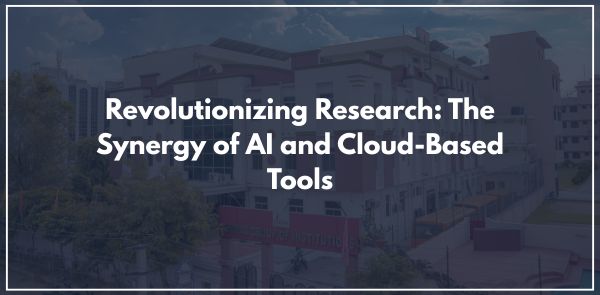In the contemporary landscape of scientific inquiry, top IT colleges like Poddar Group of Institutions, are revolutionizing research by the fusion of Artificial intelligence (AI) and Cloud-based tools which is catalyzing a paradigm shift. This powerful combination is transforming how research is conducted, analyzed, and disseminated, accelerating discovery and fostering collaboration on an unprecedented scale.
Cloud Computing: The Foundation for Scalability and Accessibility
Institutes like Poddar, with best BCA and MCA courses, are embracing cloud platforms, such as Amazon Web Services (AWS), Google Cloud Platform (GCP), and Microsoft Azure, provide researchers with on-demand access to vast computational resources, storage, and specialized services. This eliminates the need for expensive and cumbersome on-premises infrastructure, democratizing access to powerful tools.
- Scalability: Cloud computing enables researchers to scale their computational resources up or down as needed, accommodating the fluctuating demands of data-intensive projects. This elasticity is crucial for handling large datasets and complex simulations, facilitating faster analysis and experimentation.
- Accessibility and Collaboration: Cloud-based platforms facilitate seamless collaboration among researchers across geographical boundaries. Data and tools can be shared and accessed remotely, fostering real-time collaboration and accelerating the pace of discovery.
- Data Storage and Management: Cloud storage offers secure and reliable storage for massive datasets, ensuring data integrity and accessibility. Cloud-based data management tools streamline data organization, processing, and analysis, simplifying complex workflows.
AI: Enhancing Analysis and Discovery
AI, particularly Machine learning (ML) and deep learning (DL), is revolutionizing data analysis and pattern recognition in research. These techniques are enabling researchers to extract meaningful insights from complex datasets that would be impossible to analyze manually.
- Data Analysis and Pattern Recognition: AI algorithms can identify subtle patterns and correlations in large datasets, leading to new discoveries and insights. For example, in genomics, AI can analyze vast amounts of genetic data to identify disease-related genes and predict patient responses to treatment.
- Automated Experimentation and Simulation: AI can automate experimental design and simulation, optimizing parameters and predicting outcomes. This can significantly accelerate the research process and reduce the need for costly and time-consuming physical experiments.
- Natural Language Processing (NLP): NLP techniques are used to analyze and extract information from text-based data, such as scientific literature and clinical notes. This can help researchers stay up-to-date with the latest research findings and identify relevant information quickly.
- Image and Signal Processing: AI algorithms are used to analyze images and signals from various sources, such as medical imaging, microscopy, and sensor data. This can help researchers identify subtle features and patterns that would be difficult to detect manually.
The Synergistic Impact: Applications Across Disciplines
The combined power of AI and cloud-based tools is transforming research across a wide range of disciplines:
- Healthcare: AI and cloud computing are accelerating drug discovery, personalized medicine, and medical imaging analysis. AI can analyze patient data to predict disease risk and optimize treatment plans, while cloud-based platforms enable secure sharing of medical data and collaborative research.
- Genomics: AI algorithms are used to analyze vast amounts of genomic data, identifying disease-related genes and predicting patient responses to treatment. Cloud-based platforms provide the computational resources needed to process and analyze these massive datasets.
- Materials Science: AI and cloud computing are used to design and discover new materials with desired properties. AI can simulate material behavior at the atomic level, while cloud-based platforms provide the computational resources needed to run these simulations.
- Environmental Science: AI and cloud computing are used to monitor and model environmental phenomena, such as climate change and pollution. AI can analyze satellite imagery and sensor data to track environmental changes, while cloud-based platforms provide the computational resources needed to run complex climate models.
- Astronomy: Large datasets are generated by telescopes.AI and cloud computing are used to analyze these datasets, discovering new celestial objects and phenomena.
Challenges and Future Directions
While the synergy of AI and cloud-based tools holds immense promise, several challenges remain.
- Data Privacy and Security: The use of sensitive data, such as medical records and genetic information, raises concerns about data privacy and security. Robust security measures are needed to protect data from unauthorized access and ensure compliance with regulations.
- Algorithmic Bias: AI algorithms can inherit biases from the data they are trained on, leading to unfair or inaccurate results. Researchers need to be aware of these biases and develop methods to mitigate them.
- Interpretability and Explainability: Some AI algorithms, particularly deep learning models, can be difficult to interpret. Researchers are working to develop methods to make these models more transparent and explainable.
- Interoperability and Standardization: The lack of interoperability and standardization among different cloud platforms and AI tools can hinder collaboration and data sharing. Efforts are needed to develop common standards and protocols.
Looking ahead, the integration of AI and cloud-based tools will continue to revolutionize research, enabling researchers to tackle increasingly complex problems and accelerate the pace of discovery. As AI algorithms become more sophisticated and cloud platforms become more powerful, we can expect to see even greater advancements in scientific research and innovation.
So, whether you’re looking for the best MCA college in Rajasthan, or a cutting –edge BCA program, Poddar offers the perfect launchpad into a dynamic, tech-driven career.
